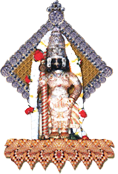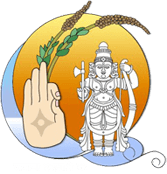Bhima sheltering at all times at the feet of the Lord had dealt severe blows to the demons (destroying them by his valorous deeds). The badly mauled demons who became powerless and lost courage ran away and dispersed. This was like clouds being dispersed by strong wind.
To avenge their being rendered powerless at the hands of the powerful Bhima, the demons schemed to take birth again in Kali Yuga. According to their innate nature, they composed evil (misleading) works propounding that Vishnu does not possess any attribute (Nirguna).
In Dwapara yuga, Manimanta, a demon who had been killed by Bhima at Gandhamadana mountain had developed a great hatred and a spirit of competition with Bhima. He performed rigorous penances to obtain Ishwara’s boon that he should be endowed with great disputational abilities. Manimanta took birth in a Brahmin family in Kaliyuga. Many other main demons were also born on this earth at the same time (with the same objective).
Like how a thieving cat tries to drink the milk, like how a lowly dog tries to steal food, like how an ape without sense tries to steal a necklace of invaluable jewels, similarly, the evil demons taking birth as brahmin pandits took away (tried to steal) the sacred Vedas and other Shastras.
Note : Stealing the Vedas and Shastras refers to their misinterpretation knowingly against their purport, leading to their effective annihilation as a source of God knowledge.
Knowing that the people will not show him respect unless he takes the vows of a sanyasi (ascetic), in a spirit of deceipt, Manimanta took the vows of an ascetic. This was similar to an untamed wild elephant wanting to stir up slush in a clear pool of water with lotuses.
Realising that Buddhism was not accepted by the people as it did not accept the validity of the Vedas, Manimanta, who had faith in it, used a suitable subterfuge to put forward Buddhism.
The wicked Manimanta called the asat of the Bauddhas as Sadasadvilakshana, and Samvruthi as Maya. To justify Shunya (of the Bauddhas), he called Brahman of Vedanta as Nirvishesha or Akhanda. As he propagated the tenets of Buddhism in a different vocabulary (claiming to be a Vedanthin), it was called Pracchanna Bauddha (concealed Bauddha).
Note: The charge that Advaita is Buddhism in another format has been made by many opposing schools and not by Madhva only. Madhvacharya has fully justified this conclusion in his compositions Tatvodyota, Vishnu Tatva Nirnaya, and Anuvyakhyana.
Brahma Sutras composed by VedaVyasa are like the Sun illuminating the tenets of Vedanta, with their aphorisms being the Sunrays. The Vedas (consisting of the Vishaya and Pramana texts) are the horses drawing the chariot of this Sun. Manimanta stole the Brahma Sutras (by his commentaries) and hence is called as a Great thief.
Though Manimanta wrote his Bhashyas on Brahmasutras claiming to be their commentator, he conveyed the exact opposite of the meanings intended by VedaVyasa. Inspite of this gross offence, VedaVyasa being an ocean of mercy did not destroy and incinerate Manimanta instantly.
The inherent pure effulgence of the Gems of the Vedas (illuminating the truth about the Supreme Being) was covered by the thick mud of gross misinterpretation in Manimanta’s commentaries. He became notorious amongst the good people as he propagated the doctrine of Non-difference (Abheda) between all entities in the world to the people ignorant of Vedanta
Manimanta and other daityas thus propagated the doctrines of: The world is unreal (Sadasadvilakshana – it is neither real nor unreal but it is different) The Supreme Being is without any attributes (gunas). There is no difference between the Supreme Being and the souls. Even the good people of the world were gradually misled and started accepting that Vasudeva (Supreme Being) who is the embodiment of infinite auspicious qualities like bliss is without such qualities.
The first chapter of Sri Madhvavijaya concludes here.
| Introduction | Index | Chapter 2 |


